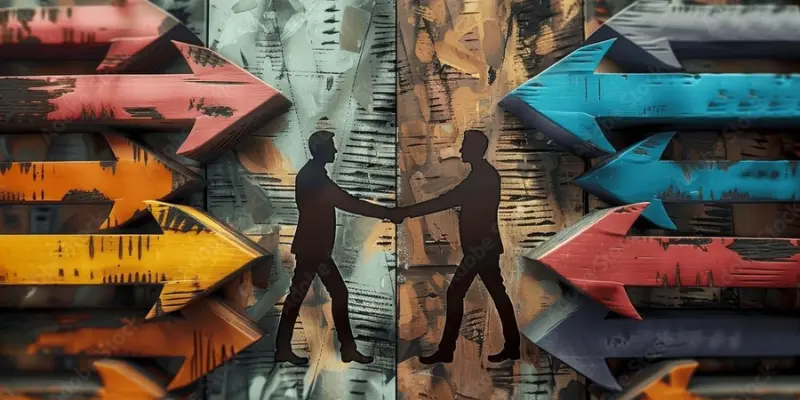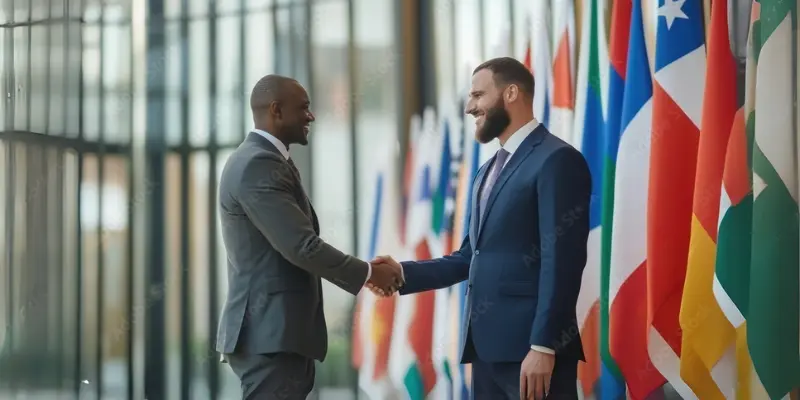What is a Diplomatic Personality? Key Skills for Success
Published: 26 Nov 2025
Do you ever wonder how some people stay calm and solve problems without arguing? They have a diplomatic personality, a unique way of handling situations with kindness and innovative thinking. These people know how to talk peacefully, avoid unnecessary fights, and ensure everyone feels heard. Having a diplomatic personality helps in daily life, work, and friendships.
Diplomacy is the art of telling people to go to hell in a way that makes them ask for directions.Winston Churchill
I’m Tanveer, a self-management expert. I have spent years learning how people can improve communication and solve conflicts wisely. In this article, I will explain what a diplomatic personality is, its key traits, why it matters, and how you can develop it.

By the end, you will know how to talk smoothly, solve problems easily, and become more confident in handling tough situations. Let’s begin this journey to becoming more diplomatic!
What is a Diplomatic Personality?
When tensions rise, who keeps the peace and finds a middle ground? That’s the power of a diplomatic personality. People with this trait know how to communicate smoothly, avoid unnecessary conflicts, and bring peace to tense situations. Whether at work, school or in personal life, diplomacy helps build stronger relationships and mutual respect.
Definition of Diplomatic Personality
A diplomatic personality means being able to handle difficult situations with tact, patience, and smart communication. These individuals think before they speak, ensuring their words don’t escalate problems. They focus on understanding others rather than proving themselves right.
It’s like being a skilled navigator: steering through storms without making waves.

Key Traits of a Diplomatic Personality
Have you ever noticed what makes some people excel at handling tough conversations? A diplomatic personality isn’t just about being polite, it’s about communicating effectively, solving problems peacefully, and building strong relationships. People with this trait naturally ease tensions and create understanding, even in challenging situations.
The supreme art of war is to subdue the enemy without fighting.Sun Tzu
Here are some key characteristics that define them:
1. Good Communication Skills
- They express their thoughts clearly and calmly.
- They choose words that prevent conflicts.
- Instead of saying, “You’re wrong,” they say, “I see your point, but here’s another perspective.”
2. Emotional Intelligence
- They understand their own emotions and others’ feelings.
- They adjust their words based on the situation.
- A short pause before responding can prevent misunderstandings.
3. Tactfulness
- They handle sensitive topics with care.
- They balance honesty with kindness.
- They know when to speak and when to listen.
4. Problem-Solving Ability
- They focus on solutions, not blame.
- They ask, “How can we fix this?” instead of “Who caused this?”
- They keep discussions productive.
5. Patience and Composure
- They stay calm under pressure.
- They don’t react emotionally in tense situations.
- Like a ship’s captain in a storm, they confidently guide situations.
6. Empathy and Active Listening
- They genuinely listen to others.
- They make people feel heard and respected.
- This builds trust and stronger relationships.
By practising these traits, you can develop a diplomatic personality and effectively handle conversations. Ready to improve your diplomacy skills? Let’s dive deeper!

Benefits of Having a Diplomatic Personality
Do you want to handle conflicts smoothly and build stronger connections? A diplomatic personality doesn’t just help in difficult conversations, it also brings long-term benefits in both personal and professional life. Being diplomatic can make you a more effective communicator, a more influential leader, and someone people trust.
Here’s how:
1. Effective Conflict Resolution
- Diplomatic people settle conflicts peacefully.
- They listen to both sides and find fair solutions.
- Instead of reacting emotionally, they focus on solving the issue.
2. Stronger Relationships
- They create positive and meaningful connections.
- By understanding different viewpoints, they reduce misunderstandings.
- People feel comfortable opening up to them.
3. Better Leadership & Negotiation Skills
- They stay calm and confident in challenging discussions.
- They know how to convince without forcing their views.
- This makes them great leaders, managers, and team players.
4. Increased Trust & Respect
- People rely on them for fair, neutral advice.
- Their ability to stay impartial earns them respect.
- Trust is built when others know they will be treated with fairness.
5. Professional Growth & Career Success
- Employers value diplomatic employees who handle situations wisely.
- They resolve workplace conflicts efficiently, improving teamwork.
- A diplomatic personality can open doors to leadership roles.
6. Reduced Stress & Better Mental Well-Being
- They avoid unnecessary arguments, keeping stress levels low.
- They focus on solutions, not problems.
- This leads to a more peaceful and balanced life.
Having a diplomatic personality is like being a bridge between people; you connect, solve, and strengthen relationships.

Want to develop these skills? Let’s explore how!
Challenges of Being Diplomatic
Does being diplomatic always make life easier? While a diplomatic personality has many benefits, it also has its own set of challenges.
Balancing tact, fairness, and emotional control isn’t always straightforward. Sometimes, being too diplomatic can even create problems.
Here are some challenges that come with it:
| 1. People May Think You Can’t Make Decisions/Can Be Perceived as Indecisive |
|---|
|
| 2. Requires Emotional Control |
|---|
|
| 3. Might Avoid Conflict Too Much |
|---|
|
| 4. Can Be Emotionally Draining |
|---|
|
| 5. May Struggle to Express Personal Opinions |
|---|
|
While these challenges exist, they can be effectively managed through self-awareness and consistent practice. Diplomacy is a skill that, when balanced correctly, strengthens relationships and improves decision-making. Want to refine your diplomatic skills and overcome these struggles? Let’s dive deeper!
Tips to Develop a Diplomatic Personality
Do you want to communicate better and solve problems peacefully? A diplomatic personality helps you stay calm, listen well, and respond wisely.
When the power of love overcomes the love of power, the world will know peace.Jimi Hendrix
Here are some simple tips to help you develop this skill.
1. Practice Active Listening
- Focus completely when someone talks, don’t interrupt.
- Nod or say short phrases like “I understand” to show interest.
- Before replying, repeat their main point to confirm understanding.
2. Pause Before Responding
- Take a deep breath before answering in tense situations.
- If unsure, say, “Let me think about it”, instead of reacting quickly.
- Avoid emotional responses; choose calm and straightforward words.
3. Use Soft and Positive Language
- Replace harsh words with softer ones (e.g., “I see your point” instead of “You’re wrong”).
- Speak in a way that makes people feel valued.
- Smile and use a friendly tone to keep conversations pleasant.
4. Handle Conflicts with a Solution-Focused Approach
- Instead of blaming, ask, “How can we fix this together?”
- Look for a middle ground where both sides benefit.
- Stay calm and suggest practical solutions instead of arguing.
5. Adapt to Different People and Situations
- Pay attention to how others communicate and adjust your tone accordingly.
- Be flexible with your opinions, but stand firm on your essential values.
- Learn from diplomatic individuals and observe how they handle challenging conversations.
6. Set Boundaries Without Being Rude
- Say, “I appreciate your view, but I prefer to do it this way.”
- Be kind but clear when refusing requests.
- Protect your time and energy while still respecting others.
Developing a diplomatic personality takes time, but small efforts lead to big improvements. Start practising these steps today; soon, you’ll notice better communication and stronger relationships!

Real-Life Examples of Diplomatic People
Who are the best examples of diplomacy in action? Many great leaders, activists, and business professionals have used diplomacy to bring positive change. Their ability to communicate, negotiate, and resolve conflicts has made a lasting impact on the world.
1. Nelson Mandela
- Mandela didn’t use force to fight injustice; he used words, patience, and strategic negotiations. Even after years in prison, he chose peace over revenge, uniting a divided nation.
- His diplomacy taught the world that understanding and forgiveness can be stronger than hatred.
2. Mahatma Gandhi
- Gandhi believed in “Ahimsa” (non-violence). Instead of fighting back with weapons, he encouraged peaceful protests and discussions.
- His ability to unite people through dialogue led India to independence, proving that words can be more powerful than force.
3. Abraham Lincoln
- During the U.S. Civil War, Lincoln faced intense conflicts. Instead of ruling with fear, he listened to different opinions and sought compromise.
- His diplomatic leadership helped keep the country united and ultimately led to the end of slavery.
4. Successful Business Leaders
- Great CEOs and entrepreneurs rely on diplomacy to lead teams, solve problems, and negotiate deals. For example, Satya Nadella transformed Microsoft by encouraging teamwork and innovation.
- A diplomatic approach in business creates trust and long-term success.
5. Unsung Heroes Around Us
- Diplomacy isn’t just for famous people; it’s in teachers who resolve student conflicts, managers who handle workplace issues, and parents who settle family disagreements.
- Even in my life, I’ve noticed that staying calm and choosing my words wisely helps build stronger relationships.
Diplomatic people inspire, lead, and bring people together. Their skills in history, business, and daily life show that patience, understanding, and strategic thinking can solve even the toughest problems. Who inspires you to be more diplomatic?
Final Verdict
It’s time to sum up. Now, we have a clear concept of what a diplomatic personality is. It is communicating effectively, staying calm under pressure, and resolving conflicts peacefully. Many great leaders and professionals use diplomacy to build strong relationships.
From my own experience, patience and respect are essential for strengthening relationships. I encourage you to develop this skill for better personal and professional interactions.
Do you think diplomacy is important in daily life? Share your thoughts!
Frequently Asked Questions
Having a diplomatic personality raises many interesting questions. Here are some common ones that might come to your mind after reading this article:
A diplomatic personality means handling conversations and conflicts calmly and wisely. Diplomatic individuals choose their words carefully and strive to maintain peace. They focus on solutions instead of arguments.
Yes! Diplomacy is a skill that anyone can learn with practice. You can become more diplomatic in daily life by improving communication, patience, and understanding.
It helps build strong relationships and solve conflicts without drama. In both personal and professional life, diplomacy earns respect and trust. It also facilitates teamwork and decision-making.
Diplomatic individuals are skilled listeners, emotionally intelligent, and remain calm under pressure. They think before speaking and choose their words carefully. They also focus on finding fair solutions rather than engaging in arguments.
Sometimes, yes. If you avoid conflicts too much, people may think you can’t make decisions. It’s essential to strike a balance between diplomacy and standing up for your values.
Start by listening carefully, thinking before you speak, and choosing respectful words. Stay calm in disagreements and try to find solutions that work for everyone. Practice makes diplomacy easier over time!
No, being diplomatic doesn’t mean agreeing with everything. It means respectfully expressing your thoughts. You can disagree without creating conflict.
| Interesting Facts |
|---|
1. Benjamin Franklin: America’s First Diplomat Benjamin Franklin, one of the Founding Fathers of the United States, was also the nation’s first diplomat. He was crucial in securing French support during the American Revolutionary War, vital for America’s victory. 2. Harriet Elam-Thomas: Breaking Barriers in Diplomacy Harriet Elam-Thomas, an African American diplomat, had a distinguished four-decade career in the U.S. Foreign Service. She served in various countries, including Senegal, Mali, and Greece, and inspired many in the field of diplomacy. 3. Henry Kissinger: Nobel Peace Prize Controversy Henry Kissinger, U.S. Secretary of State from 1973 to 1977, was awarded the Nobel Peace Prize in 1973 for his efforts in negotiating a ceasefire during the Vietnam War. However, the award was controversial, as his counterpart, Lê Đức Thọ, declined the prize, stating that peace had not been achieved. 4. Clifton R. Wharton Sr: Pioneering African American Diplomat Clifton R. Wharton Sr. was the first African American Foreign Service Officer in the U.S. Department of State. His groundbreaking career paved the way for future generations of African American diplomats. |







Very informative ⭐⭐⭐⭐⭐